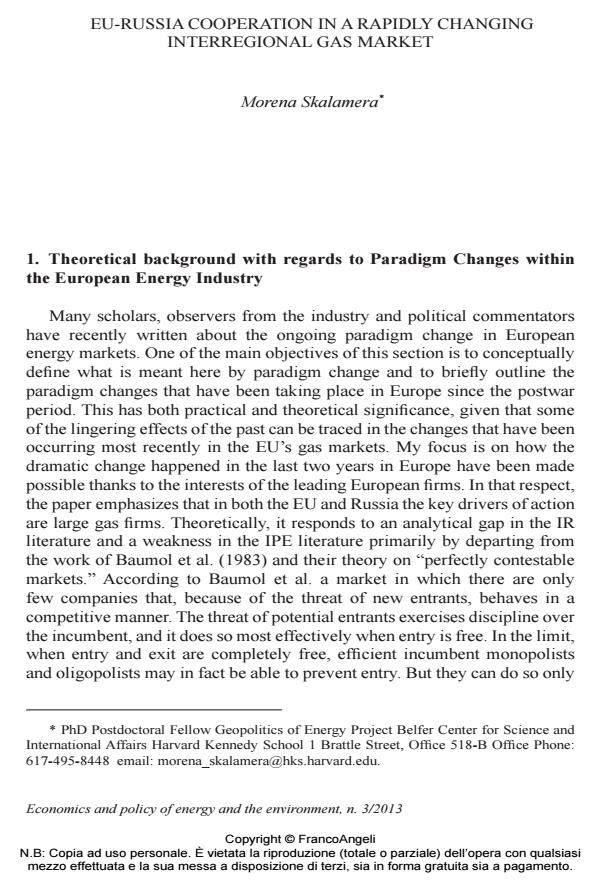EU-Russia Cooperation in a rapidly changing interregional gas market
Titolo Rivista ECONOMICS AND POLICY OF ENERGY AND THE ENVIRONMENT
Autori/Curatori Morena Skalamera
Anno di pubblicazione 2014 Fascicolo 2013/3
Lingua Inglese Numero pagine 35 P. 31-65 Dimensione file 2056 KB
DOI 10.3280/EFE2013-003002
Il DOI è il codice a barre della proprietà intellettuale: per saperne di più
clicca qui
Qui sotto puoi vedere in anteprima la prima pagina di questo articolo.
Se questo articolo ti interessa, lo puoi acquistare (e scaricare in formato pdf) seguendo le facili indicazioni per acquistare il download credit. Acquista Download Credits per scaricare questo Articolo in formato PDF

FrancoAngeli è membro della Publishers International Linking Association, Inc (PILA), associazione indipendente e non profit per facilitare (attraverso i servizi tecnologici implementati da CrossRef.org) l’accesso degli studiosi ai contenuti digitali nelle pubblicazioni professionali e scientifiche.
In the past few years the gas sector has experienced a wave of unprecedented changes. The increasing globalization of gas markets and the technological breakthrough of shale gas production in the United States have triggered deep changes in Eurasian gas market governance. The long-established oil indexation in gas contracts is now challenged not only by the European Commission’s efforts at liberalization but also by the private sector. The industrial sector’s support for change has provoked a robust redefinition of gas governance structures between Russia and the EU, amidst Russian calls for the support of long-term gas contracts. The latter, from its perspective as a rising power in its own right, has no intention of importing EU’s regulatory structures on its territory and is resisting them while operating in the EU. Against this background, this paper seeks to investigate the issues that are arising with respect to the EU’s desire to change the institutional arrangements in gas trade with Russia. If the EU seizes the paradigm change as a moment to take Russia’s proposals and ideas into consideration, the energy partnership could become more solid and symmetrical. In contrast, should the downward spiral of mutual disappointment continue, Russia will increasingly turn eastwards. In that context, if the US decides to withhold its shale gas bonanza for domestic use during a complicated shale revolution in the Old continent, the unreliability of Russian gas could force Europe to rethink its strategies.
Parole chiave:EU-Russia, energy cooperation, paradigm change, industrial sector’s interests
Jel codes:Q48
- From “Greater Europe” to “Greater Eurasia”: Status concerns and the evolution of Russia’s approach to alignment and regional integration Andrej Krickovic, Igor Pellicciari, in Journal of Eurasian Studies /2021 pp.86
DOI: 10.1177/1879366521998808
Morena Skalamera, EU-Russia Cooperation in a rapidly changing interregional gas market in "ECONOMICS AND POLICY OF ENERGY AND THE ENVIRONMENT" 3/2013, pp 31-65, DOI: 10.3280/EFE2013-003002